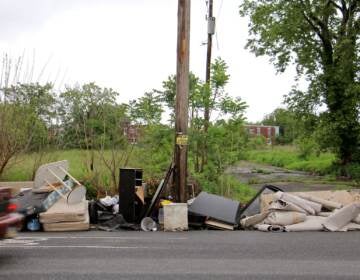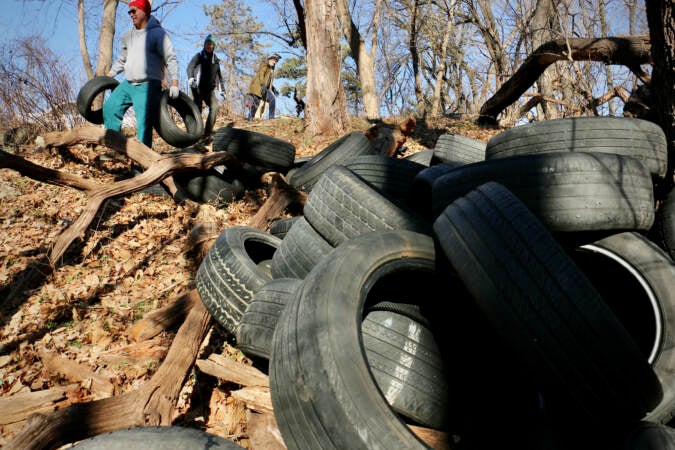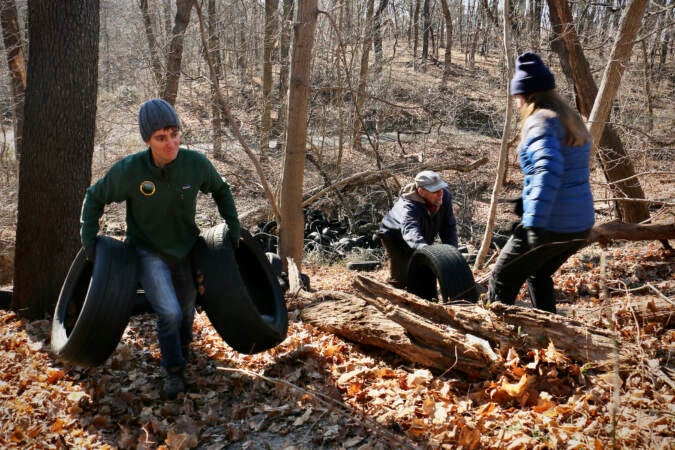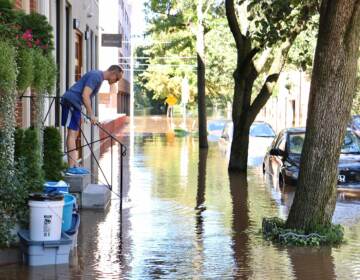Volunteers tackle short-dumping along Tacony Creek
Hundreds of tires, a deflated soccer ball, and a bag of bones are just some of the items cleaned up as part of the King Day of Service in North Philadelphia.
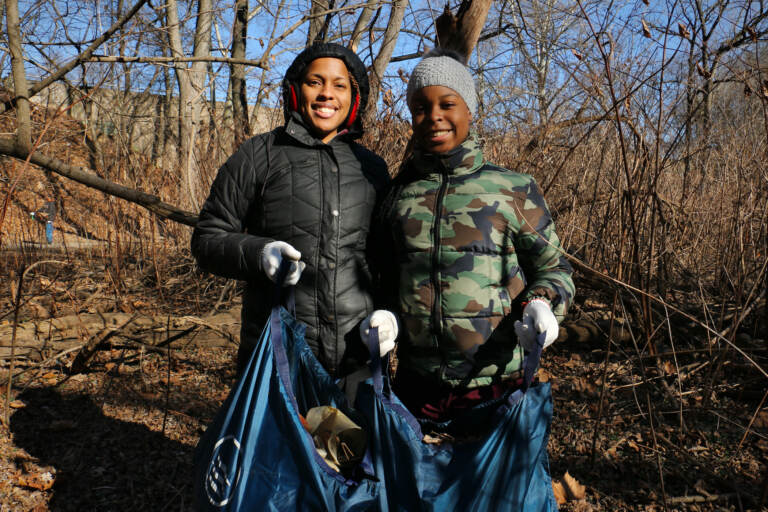
Shelley Henderson (left) and her daughter, Jaylynn Chalmers, 13, work together to clean up Tacony Creek Park. The two joined dozens of volunteers who participated in the MLK Day of Service project hosted by the Tookany/Tacony-Frankford Watershed Partnership on Jan. 16, 2023. (Emma Lee/WHYY)
Dozens of volunteers honored Dr. Martin Luther King Jr. Monday by picking up trash and tackling short-dumping at Tacony Creek Park in North Philadelphia’s Feltonville neighborhood.
About 400 tires dumped in the park earlier this month were carted away Saturday, but hundreds more littered the landscape along Takony Creek on Monday.
The park serves as a rare greenspace in a neighborhood that struggles with poverty. Advocates say city services for the park are almost nonexistent, illustrating an example of environmental injustice that runs counter to Dr. King’s fight for racial and economic justice.
Dozens of volunteers participating in the MLK Day of Service fanned out along the creek’s muddy and eroded banks to collect trash in reusable blue bags — finding everything from a deflated soccer ball to a broken dresser, and even a bag of bones.
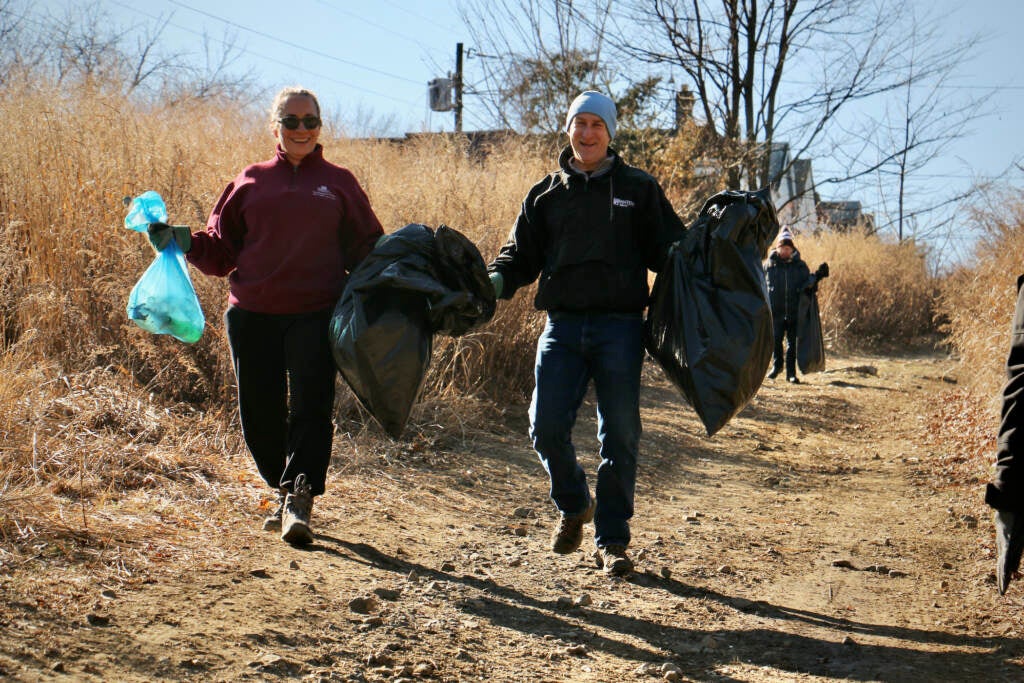
Workers from the Philadelphia Water Department helped the volunteers load tires onto a waiting truck beneath the Whitaker Avenue bridge.
The park is a hot spot for illegal dumping, said Julie Slavet, director of the Tookany/Tacony-Frankford Watershed Partnership, which organized the day’s service project.
“We have weekly cleanups here,” Slavet said. “The Department of Parks and Recreation won’t put trash cans along the trail because they can’t afford to service them. It’s a matter of resource allocation, which Dr. King addressed.”
On April 4, 1968, the day the civil rights leader was killed, King was in Memphis to support the sanitation worker’s strike. Funding and supporting sanitation workers is one way to address the neglect of a park that lies far from the more tended greenspaces closer to Center City, Slavet said.
Short-dumping plagues the entire city, but primarily impacts communities of color and neighborhoods with low income.
Cleaning up after illegal dumping remains a constant chore for the TTF Watershed Partnership, a nonprofit organization dedicated to watershed education and water quality improvement that gets part of its funding from the Philadelphia Water Department and upstream communities.
Slavet says King committed himself to racial and economic equality. But that inequality still exists, and poverty, she says, is at the root of dumping.
“Contractors, a couple of guys with a truck, they go do a cleanout in somebody’s house and they don’t have the money to get rid of it the way the Streets Department offers, or it’s not convenient enough and they dump it in a park. It’s the same with the tires.”
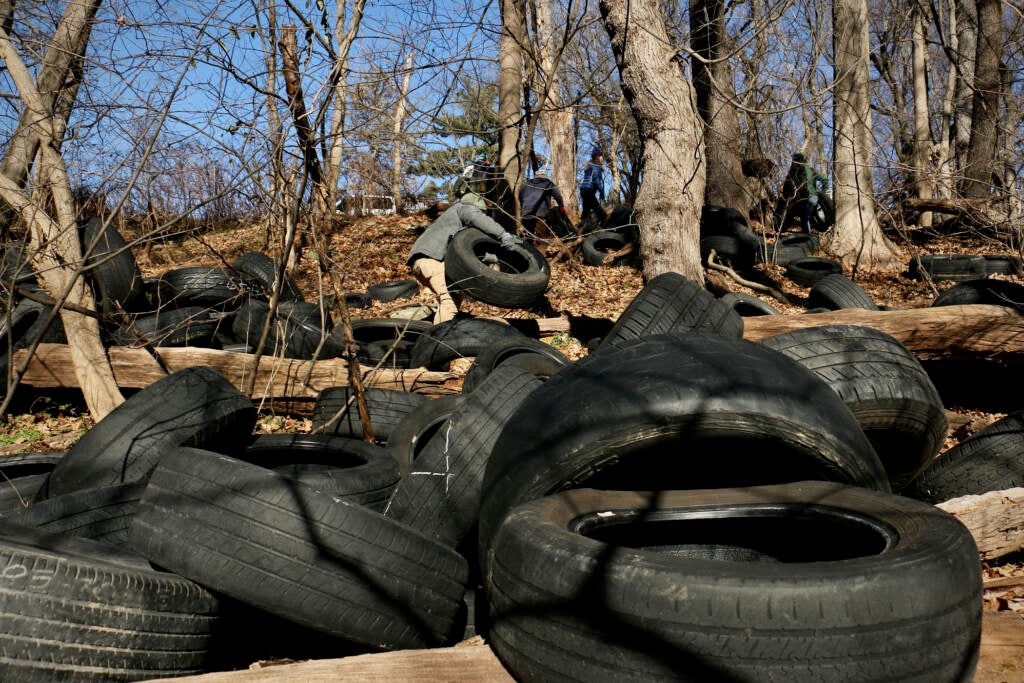
Shelley Henderson came out with her entire family, her husband, two kids, and their puppy. She was surprised to find caulk, likely from a contractor.
She says the economic injustice King spoke out against is illustrated in the trash that clutters the banks of Tacony Creek.
“You see a lot of things rooted in inequality, homelessness, and poverty,” she said. “So when you see used sanitary items, it’s not purely coming from a place of people not caring … but that some people out here are [living] out here.”
Henderson, who grew up in Olney and would visit the park with her father, says it’s a family tradition to do volunteer work in honor of King, and she wants to pass that ritual on to her children.
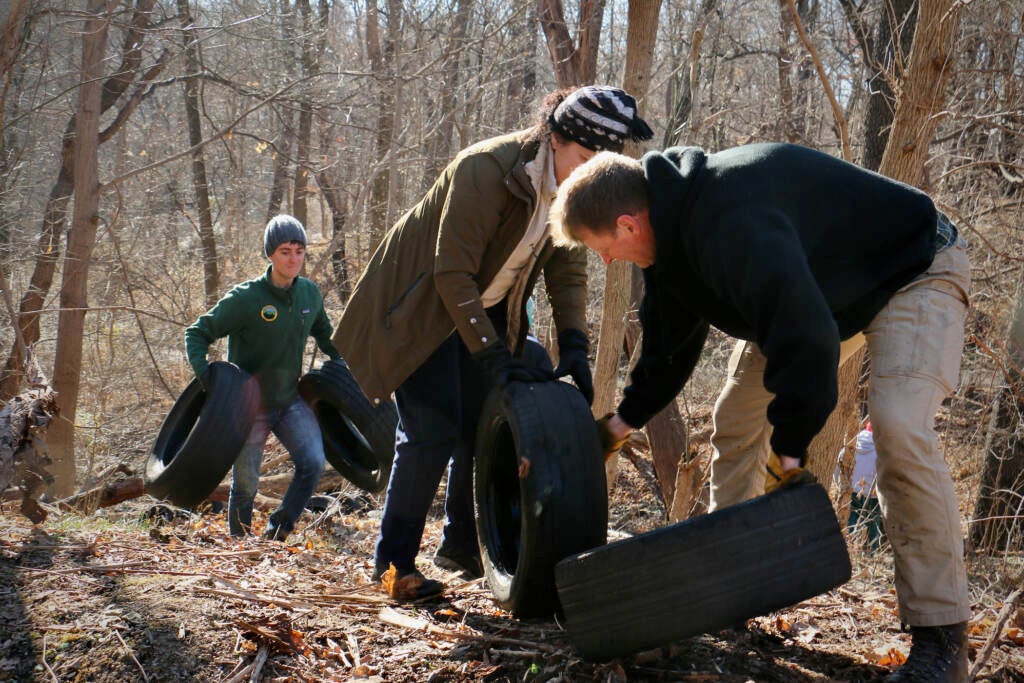
“I want them to have a commitment to our community and to the community where we grew up,” she said. “And I want this place to be as safe and as amazing for everybody as possible. And since it was such a fight to get [MLK Day] to be a national holiday, I can’t think of any better way to honor him than doing something for somebody else.”
The Tookany/Tacony-Frankford Watershed Partnership organized the event with the help of the Philadelphia Water Department, the Department of Parks and Recreation, United by Blue, and Keep Pennsylvania Beautiful. Keep Pennsylvania Beautiful paid for the trucks to haul away the tires.
Tires, in particular, pose a public health risk as breeding grounds for mosquitos that carry West Nile Virus and other diseases. Tire piles can also catch fire, creating air pollution, and the melted toxic material then flows into nearby waterways.
“We’re trying to look at short- and long-term solutions for this problem,” said Slavet, “including cameras, and making sure people have enough money so they don’t have to dump stuff.”
In the meantime, the group will continue to hold weekly volunteer trash pickups. But Slavet says that’s not a real solution.
“Part of this is poverty, and it’s connected to how the city does not function,” she said.
The minimum fee required to legally dispose of non-household trash at private facilities is $100, according to Circular Philadelphia.
The organization has proposed a plan that would use existing city-run sanitation centers and charge $30 for small hauls of construction debris. The organization says the plan would be revenue neutral or, at the very least, cheaper than it is to clean up sites like the tire dump in Tacony Creek Park.
Under Pennsylvania law, waste tires must be taken to a licensed recycling facility, or if to a landfill, must be chopped or shredded before disposal. This can be expensive for small tire shops.
Beyond dumping, Tacony Creek faces other challenges
The TTF Watershed encompasses 30 square miles in Montgomery County, North Philadelphia, and Northeast Philadelphia. The main stem of the creek has three separate names. With its headwaters in eastern Montgomery County, it’s called the Tookany Creek. In Philadelphia, it becomes Tacony Creek. Eventually, before it flows into the Delaware, it meets up with Wingohocking Creek to become Frankford Creek.
Like waterways across the city, Tacony Creek is polluted primarily by runoff and raw sewage resulting from heavy rain events. The city’s combined sewage and stormwater system means that if the system is overloaded, untreated sewage flows into the creek.
“They don’t function like creeks are supposed to anymore,” said Slavet. “An average of once a week a year, raw sewage goes into the Tacony Creek.”
She says the creek has the largest sewage outfall of any in the city, which is in Juniata Park. While Tacony Creek flows above ground through the park, almost all the creeks in Philadelphia are diverted into tunnels underground and serve as the city’s sewer system.

Get daily updates from WHYY News!
WHYY is your source for fact-based, in-depth journalism and information. As a nonprofit organization, we rely on financial support from readers like you. Please give today.



